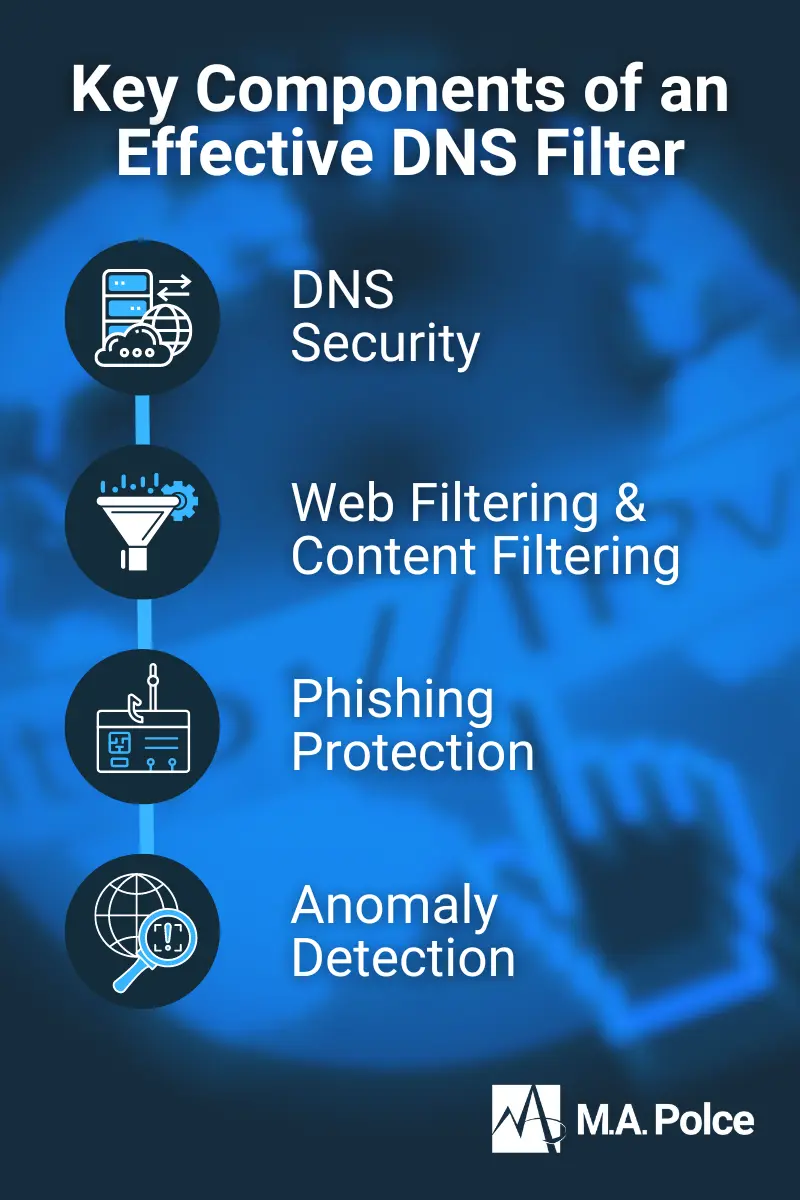DNS layer security is a core component of overall cybersecurity, but your organization might not be aware of the risk. Domain name system (DNS) matches domain names to IP addresses to allow users to access websites and applications. When DNS is working as it should, it delivers a seamless experience. Businesses can take it for granted — until cyberattacks occur.
The financial repercussions of a DNS-layer cyberattack can be staggering. Research suggests that a successful DNS attack could set a business back by approximately $1.1 million. This stark figure underscores the necessity for organizations to prioritize DNS layer security. To delve deeper into DNS, its potential security risks, and effective implementation of DNS security, continue reading.
What is DNS?
Domain name system is sometimes called the phonebook of the internet. Just as a phonebook matches phone numbers with names, DNS matches domain names to IP addresses. An IP (Internet Protocol) address is a sequence of numbers associated with a specific computer or network.
When a user enters a website into a browser, the DNS server translates it into a unique IP address and responds with the correct web address. Some users may know the IP address, which they could type directly into the browser. However, remembering a website or application name is much easier.
Internet users rely on DNS multiple times a day without thinking about it. Every time they connect to a website or use an app on a mobile device, DNS is at work. For this reason, DNS is considered foundational to internet operations.
DNS Security Risks
Organizations may neglect DNS layer security simply because they don’t think about it. What’s more, DNS protocols weren’t created with security in mind. They’re highly susceptible to a range of cyberattacks, including:
DoS and DDoS Attacks
Denial-of-service (DoS) happens when threat actors overwhelm networks with traffic to the point the network cannot respond or crashes. This prevents access for legitimate users. Similarly, distributed denial-of-service (DDoS) occurs when several machines attack a single target. It often involves a botnet, a group of internet-connected devices hijacked by threat actors for large-scale cyberattacks. Cybercriminals prey on a device’s weaknesses or security to take control and issue the attack.
These attacks are especially prevalent. Cyber Magazine reports that DDoS attacks increased by 200% between 2022 and 2023. Security Magazine also details a report about the cost of DDoS attacks: successful DDoS can cost businesses an average of $6,130 a minute. Without DNS layer security, companies may be at an increased risk for DDoS attacks.
DNS Amplification
DNS amplification happens when a cybercriminal fakes the source address of a DNS request, sending the answer to a different IP address. It takes advantage of User Datagram Protocol (UDP), which is how DNS sends information through the internet. It’s called DNS amplification because DNS responses are larger than the request. So, when a small request is sent, an attacker configures a bigger response. This allows cybercriminals to scale up (amplify) attacks.
DNS Hijacking
DNS hijacking is a general term for any attack that tricks a user into thinking they’ve connected to a trustworthy domain and not a malicious site. Cybercriminals accomplish this by using a compromised or hostile DNS server or tricking an authentic DNS server into storing incorrect data.
DNS Tunneling
With DNS tunneling, threat actors purchase domains and install malware on their servers. If a user connects to the attacker’s site, malware is sent to their device. It creates a “tunnel” between the bad site and the user’s DNS.
DNS Spoofing
An attacker inserts fake data, like a compromised web address, into a DNS or web cache. The user is redirected to a malicious site. This situation is DNS spoofing, also called cache poisoning. If successful, an attacker can steal the user’s website address and use it for more cybercrimes, like spreading viruses.
DNS Security Measures
Although security risks at the DNS layer pose a significant threat, DNS security measures can be more impactful. According to a report from the Global Cyber Alliance, DNS firewalls are believed to have prevented $10 billion in data breach losses over the past few years.
DNS security is the concept; DNS Security Extensions (DNSSEC) is the execution. DNSSEC are specific strategies for enforcing DNS layer security, such as DNS filtering and cache poisoning prevention. These strategies leverage cryptography to authenticate DNS requests and responses. They also verify that responses weren’t doctored during transit.
The cybersecurity team at M.A. Polce delivers a range of services to help your business maintain comprehensive protection against cyber threats, including DNS layer security. Here, they detail the key components of an effective DNS filter:
Domain Name System (DNS) Security
DNS Security offers secure DNS resolution services to help prevent DNS-based attacks like DNS hijacking and DNS cache poisoning. By leveraging advanced threat intelligence and machine learning algorithms, OpenDNS can detect and block malicious domains in real-time.
Web Filtering and Content Filtering
Web filtering and content filtering allow administrators to enforce policies for web content filtering, blocking access to inappropriate or malicious websites in categories like adult content, gambling, social networking, and more. This control helps organizations ensure compliance with acceptable use policies and protect users from exposure to harmful content.
Phishing Protection
Phishing protection defends against phishing attacks by blocking access to known phishing websites and detecting suspicious URLs in real-time. This control helps prevent users from falling victim to phishing scams, which often attempt to steal sensitive information such as login credentials, financial data, or personal information.
Anomaly Detection
Anomaly Detection continuously monitors network traffic patterns and DNS behavior to detect anomalies indicative of potential security threats, such as DNS tunneling, data exfiltration, or malware infections. By identifying deviations from normal network behavior, it can alert administrators to suspicious activities and potential security incidents.

DNS Layer Security Benefits
More organizations recognize the importance of DNS security, with one report finding that 80% of organizations think DNS layer security is critical to their protection. Implementing specific measures at the DNS layer ensures greater accuracy in identifying malicious activity and enables teams to respond to threats proactively. It strengthens overall cybersecurity, can improve network performance, and can simplify DNS management. Enhanced security ensures sensitive data is less likely to be compromised, which helps an organization stay compliant with regulatory guidelines.
Implementing DNS Layer Security
Before implementing DNS security measures, it helps to know the best practices for protecting this layer. For example, access controls are an important consideration. Not every user needs access to every DNS server or all datasets. Access controls ensure employees only access the servers and data they need to perform their tasks.
Although some domain names or servers are open to the public, you want to protect your main DNS server. No primary servers with potentially sensitive data should be accessible to the public. Reserve secondary DNS servers for external users.
Since DNS is fundamental to network applications, you want a primary and secondary server to ensure mission-critical services are available. Administrators can configure the continuous replication and transmission of data from the primary to the secondary DNS servers. Then, if the primary server malfunctions, teams can automatically switch to the secondary server.
Improve DNS Security With M.A. Polce
When businesses ensure security at the DNS layer, they protect their networks, applications, and data from various cyber threats. Small and medium-sized organizations that wish to enhance DNS security find a long-term partner in M.A. Polce. Serving SMBs across New York State, M.A. Polce is a SOC 2-certified IT provider that delivers cybersecurity services that align with your goals. Contact us to learn more about adopting DNS layer security and how M.A. Polce can help.



